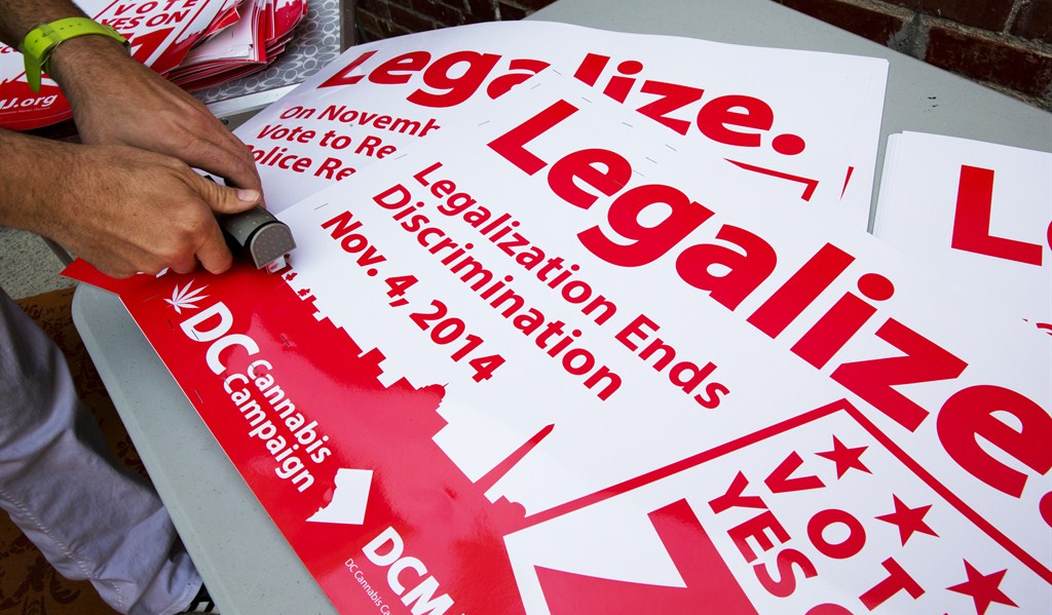Harold Rogers, the Kentucky Republican who chairs the House Appropriations Committee, says a rider in the omnibus spending bill that Congress enacted last month stops the District of Columbia from legalizing marijuana. Eleanor Holmes Norton, the District's congressional delegate, disagrees. So do D.C. Mayor Muriel Bowser, D.C. Council Chairman Phil Mendelson and D.C. Attorney General Karl Racine.
Surprisingly, given the sway that Congress has over D.C., it looks like Rogers will lose this argument, and marijuana will soon be legal in the nation's capital. Rogers' disadvantage reflects the shifting politics of marijuana legalization, which have left pot prohibitionists in a weaker position than ever before.
The legal dispute between Rogers and D.C. officials comes down to three missing words. The appropriations bill bars the District from using "funds contained in this act" to "enact any law, rule or regulation to legalize or otherwise reduce penalties associated with the possession, use or distribution of any schedule I substance."
Originally, the rider, introduced by Rep. Andy Harris, R-Md., said "enact or carry out," but the latter three words were stricken during negotiations with Democrats. Norton et al. say that change means the rider does not override Initiative 71, the marijuana legalization measure that D.C. voters overwhelmingly approved in November, because the initiative has already been enacted.
D.C. officials seem to have a pretty solid argument, since Initiative 71, which eliminates penalties for marijuana possession, sharing and home cultivation, does not require any additional legislation to take effect. Under the District of Columbia Home Rule Act, the initiative takes effect automatically unless Congress approves a joint resolution rejecting it no later than 30 legislative days after Mendelson submits it for review, which he plans to do this month.
Recommended
If a resolution of approval is passed and signed by the president before the review period ends, the resolution "shall be deemed to have repealed" the initiative. A law cannot be repealed unless it has already been enacted.
Harris claims his rider "prevents the ultimate enactment of the ballot initiative." But according to Walter Smith, executive director of the D.C. Appleseed Center for Law and Justice, it is "highly unlikely" that Harris will get a chance to make that argument in court.
"I think no one's going to have standing to bring a lawsuit here," says Smith, who notes that the courts tend to look askance at requests by members of Congress to resolve disputes like this one, partly because legislators can always clarify things with new legislation. "The courts would, I think, be very reluctant to step in and litigate something that could be fixed legislatively," he says.
Such a legislative fix may be hard to manage, however. The most straightforward approach -- a resolution of disapproval -- is unlikely to get through the House and Senate within 30 legislative days, let alone be signed by a president who opposes congressional meddling with the District's marijuana policies.
The prospects for any other bill that requires a separate vote look pretty dim, as well. Harris managed to get his rider enacted only by slipping it into a must-pass spending bill at the end of a legislative session.
By contrast, an amendment in the same spending bill aimed at preventing federal interference with medical marijuana laws -- including the District's -- passed the House last May with support from 219 members, including 49 Republicans. That suggests Harris could not count on support from his fellow Republicans if he tries to reverse Initiative 71 with new legislation.
James Jones, communications director at D.C. Vote, a group that supports greater autonomy for the District, notes that Harris must contend with Republicans' avowed preference for federalism and local control. "There's a strong element of their own party that thinks the states should determine this policy," he says.
Furthermore, Republicans are aware of polls indicating that most Americans support marijuana legalization. "This issue is moving quickly nationwide," Jones says. "The Republicans don't want to get on the wrong side of it."

























Join the conversation as a VIP Member